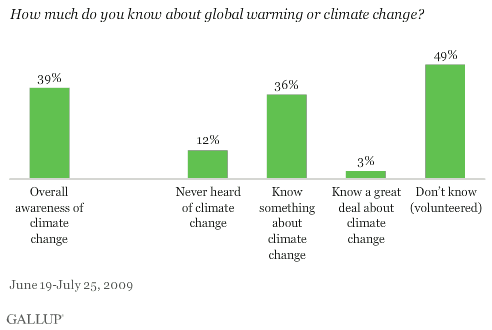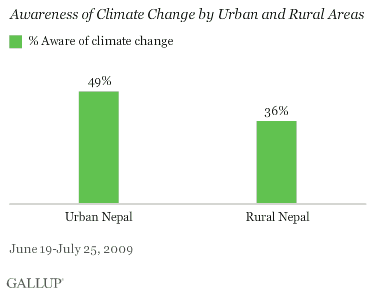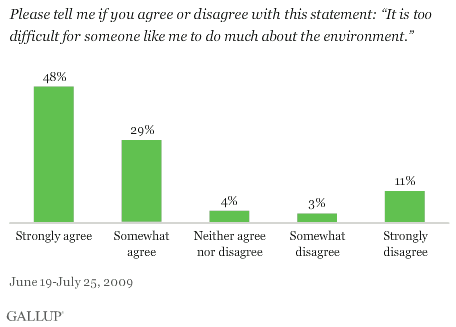WASHINGTON, D.C. -- Just before the United Nations Climate Change Conference began in Copenhagen, Denmark, Nepal's top politicians conducted a cabinet meeting high in the sky -- more than 3 miles up in the Himalayas at the base of Mount Everest -- in an attempt to draw world attention to the danger global warming poses to glaciers. Yet among Nepal's own citizens, awareness of global warming or climate change is low. In a Gallup survey conducted in July, 39% of Nepalese say they are aware of climate change -- essentially unchanged from the 37% average awareness across 2007 and 2008.

When compared with its two neighbors, awareness in Nepal is about on par with average awareness in India (35%), but lower than average awareness in China (62%).
A largely poor, agrarian nation, Nepal is home to some of the most extreme topography on the planet, ranging from 8 of the world's 10 highest mountain peaks to the low-lying Ganges River basin, leaving the nation's crop production highly susceptible to abrupt climate variations. Although Nepal's rural residents may be more likely to observe evidence of climate change in flooded or drought-ridden agricultural fields, awareness is significantly higher among urban Nepalese (49%) than among those living in rural areas (36%).

Irrespective of whether Nepalese live in cities or the countryside, climate change is contributing to a crisis in their food supply -- especially hard hit is the one-third of the population that lives below the poverty line. Weather patterns that used to occur in predictable cycles no longer do so. Sudden intense rainfall; longer, drier winters; delayed monsoon seasons; and dramatic changes in temperature are believed to be caused in part by thawing Himalayan glaciers, resulting in farm fields that are subjected to drought, fire, flash floods, landslides, and soil erosion.
According to climate change experts, Nepal's citizens can undertake initiatives such as planting crops that are more resistant to climate variation, better water management, the use of certain plants to halt soil erosion, early flood warning systems, among many others. First, however, the Nepalese population must shift from passivity to adaptation and action. At this time, a majority (77%) agree that it is "too difficult for someone like me to do much about the environment."

In addition to their recent sky-top cabinet meeting, Nepal's government has been proactively trying to limit negative environmental impact on its citizens by joining the United Nations Framework Convention on Climate Change and creating a National Adaptation Program of Action, two initiatives the government hopes will result in substantial funding for climate change adaptation. But if progress is to be made, Nepal's citizens -- poor rural farmers, in particular -- will need to be educated about global warming. Even during the recent years of poor crop yields attributable to temperature extremes and alternating tumultuous floods and drought, awareness of climate change has remained static.
For complete data sets or custom research from the more than 150 countries Gallup continually surveys, please contact worldpollpartners@gallup.com or call 202.715.3030.
Survey Methods
Results are based on face-to-face interviews with more than 1,000 adults, aged 15 and older, conducted June 19-July 25, 2009 in Nepal. For results based on the total sample of national adults, one can say with 95% confidence that the maximum margin of sampling error is ±3.6 percentage points. The margin of error reflects the influence of data weighting. In addition to sampling error, question wording and practical difficulties in conducting surveys can introduce error or bias into the findings of public opinion polls.
